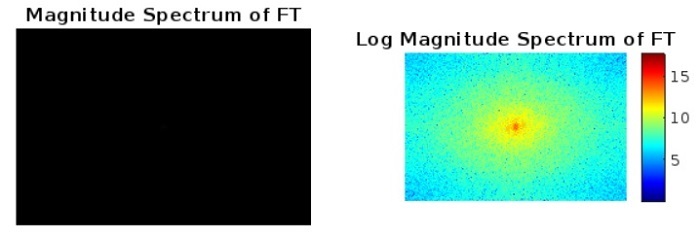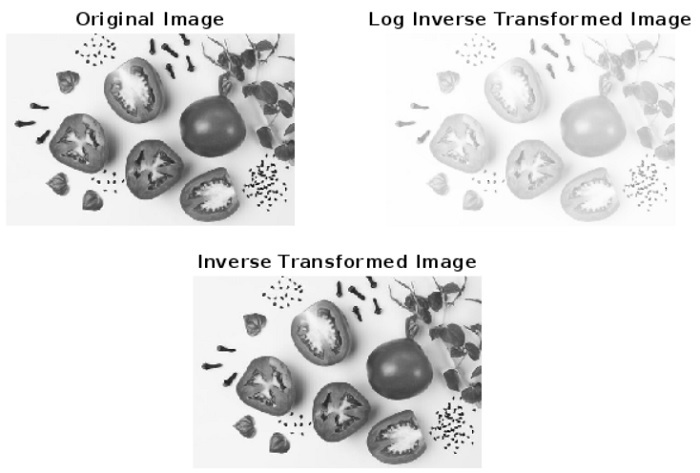MATLAB 中图像的正向和逆向傅里叶变换
在数学中,傅里叶变换是一种用于将函数或信号从时域转换为频域的数学工具。它广泛应用于信号处理、通信、图像处理和分析等领域。
在使用 MATLAB 查找图像的正向和逆向傅里叶变换之前,让我们先简要概述一下傅里叶变换及其逆变换。
正向傅里叶变换
傅里叶变换或正向傅里叶变换是一种数学运算,用于将信号从时域转换为频域。
因此,正向傅里叶变换以其频率成分来表示信号。当我们对信号执行正向傅里叶变换时,它会生成一个复值函数,该函数表示输入信号在不同频率下的幅度和相位。
在数学上,时域信号“x(t)”的傅里叶变换定义为:
$$\mathrm{X(\omega)=\int_{−\infty}^{\infty}x(t)e^{−j\omega t}dt}$$
其中,X(ω) 是 x(t) 的傅里叶变换。
现在,让我们讨论逆傅里叶变换。
逆傅里叶变换
逆傅里叶变换是正向傅里叶变换的反向操作。它被定义为一种数学运算,将频域信号转换为时域信号。
在信号处理中,它主要用于从变换后的信号重建原始信号。
在数学上,频域信号的逆傅里叶变换可以定义为:
$$\mathrm{x(t)=\frac{1}{2\pi} \int_{−\infty}^{\infty}X(\omega)e^{j\omega t}\:d\omega}$$
这里,x(t) 是从其傅里叶变换版本重建的信号。
这就是关于正向傅里叶变换和逆正向傅里叶变换的所有内容。现在让我们讨论如何使用 MATLAB 查找图像的正向和逆向傅里叶变换。
使用 MATLAB 进行图像的正向傅里叶变换
在 MATLAB 中,我们可以使用“fft2”函数来执行图像的正向傅里叶变换。下面解释了使用 MATLAB 查找图像的正向傅里叶变换的分步过程
步骤 (1) – 读取原始输入图像,并在需要时将其转换为灰度图像。
步骤 (2) – 使用“fft2”函数执行图像的傅里叶变换。
步骤 (3) – 使用“fftshift”函数将傅里叶变换从角点移到中心。
步骤 (4) – 取移位傅里叶变换的绝对值以计算其幅度谱。
步骤 (5) – 显示傅里叶变换的幅度谱。
示例
现在,让我们考虑一个 MATLAB 中的示例程序,以便更好地理解这个概念。
% MATLAB code to find forward Fourier transform of an image
% Read the original input image
img = imread('https://tutorialspoint.com/assets/questions/media/14304-1687425236.jpg');
% Convert the input image to grayscale
gray_img = rgb2gray(img);
% Calculate Fourier Transform of the image
FT = fftshift(fft2(gray_img));
% Calculate the magnitude spectrum of Fourier transform
mag_spect = abs(FT);
% Take the log of magnitude spectrum
mag_spect_log = log(1 + mag_spect); % Adding 1 to avoid log(0)
% Display the magnitude spectrum of the Fourier transform
figure;
subplot(1, 2, 1);
imshow(mag_spect, []);
title('Magnitude Spectrum of FT');
subplot(1, 2, 2);
imshow(mag_spect_log, []);
title('Log Magnitude Spectrum of FT');
colormap(gca, 'jet');
colorbar;
输出

这就是我们如何在 MATLAB 中查找图像的正向傅里叶变换的方法。现在,让我们学习如何查找图像的逆傅里叶变换。
使用 MATLAB 进行图像的逆傅里叶变换
MATLAB 提供了一个内置函数“ifft2”来查找函数或信号的逆傅里叶变换。
在这里,我们解释了使用 MATLAB 查找图像的逆傅里叶变换的分步过程
步骤 (1) – 读取傅里叶变换后的图像。
步骤 (2) – 应用“ifft2”函数查找逆傅里叶变换后的图像。
步骤 (3) – 取逆傅里叶变换后图像的绝对值的 log 值。
步骤 (4) – 显示逆傅里叶变换后的图像。
示例
以下示例程序演示了这些步骤的实际实现,以使用 MATLAB 查找图像的逆傅里叶变换。
% MATLAB code to perform Inverse Fourier Transform of an image
% Read the original input image
img = imread('https://tutorialspoint.com/assets/questions/media/14304-1687425236.jpg');
% Convert the input image to grayscale
gray_img = rgb2gray(img);
% Calculate Fourier Transform of the image
FT = fftshift(fft2(gray_img));
% Find inverse Fourier Transform of the Fourier transformed image
inverse_FT_img = ifft2(ifftshift(FT)); % FT is the Fourier transformed image
% Take the log of the absolute value of the inverse transformed image
inverse_FT_img_log = log(abs(inverse_FT_img));
% Display the original, log-transformed, and inverse transformed images
subplot(2, 2, 1);
imshow(gray_img);
title('Original Image');
subplot(2, 2, 2);
imshow(inverse_FT_img_log, []);
title('Log Inverse Transformed Image');
subplot(2, 2, 3);
imshow(abs(inverse_FT_img), []);
title('Inverse Transformed Image');
输出

这就是我们如何在 MATLAB 中通过遵循简单的步骤查找图像的逆傅里叶变换的方法。
结论
在本教程中,我们解释了傅里叶变换 (FT) 和逆傅里叶变换 (IFT) 的概念。我们还通过示例程序解释了如何在 MATLAB 中查找正向傅里叶变换和逆傅里叶变换。您可以使用自己的图像尝试以上代码来查找它们的 FT 和 IFT。


 数据结构
数据结构 网络
网络 RDBMS
RDBMS 操作系统
操作系统 Java
Java iOS
iOS HTML
HTML CSS
CSS Android
Android Python
Python C 语言编程
C 语言编程 C++
C++ C#
C# MongoDB
MongoDB MySQL
MySQL Javascript
Javascript PHP
PHP